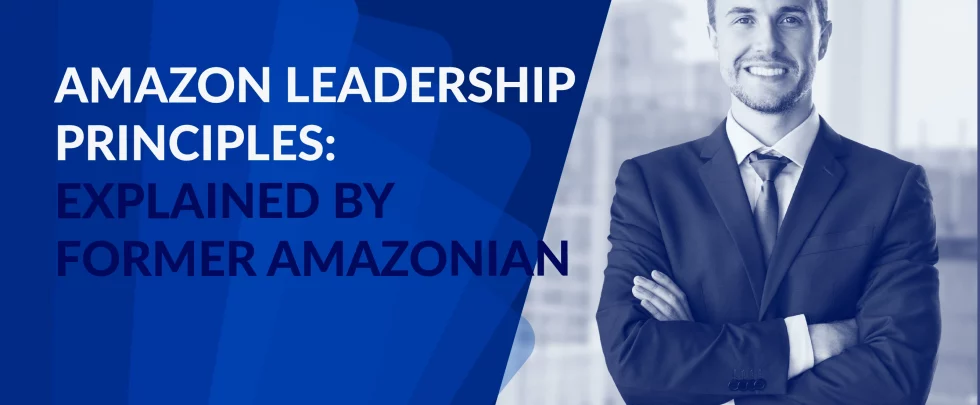This is a post from the founder of Interviewjoy & seller on the website, Ozgur Unlu. An ex-Amazon marketing leader.
As a manager, team leader, or entrepreneur, you know that leadership isn’t a trait. It’s something you have to practice every day.
Sure, you might have a job title or a leadership position, but real leaders don’t respond. Instead, they take action. They know when questions aren’t worth asking or when a situation is beyond their control.
As a former Amazonian, today I want to share some crucial information about the Amazon Leadership Principles.
Let’s dive in!
Amazon Leadership Principles are one of the key factors in the Amazon interview process. They set the standards for recruitment but also help to define the culture and values that Amazon wants a team to have.
Needless to say, they are the building blocks of strong leadership and Amazon’s company culture as well.
Having awareness of these principles can significantly boost your business efficiency while increasing your chances to get hired by Amazon.
You will also have a better understanding of Amazon’s values and how it managed to be one of the fastest-growing companies in history.
Today, Amazon has higher brand value all around the world than tech giants such as Google and Apple. As a successful company, Amazon went from zero to hero in less than three decades and is enjoying $400 billion in net revenue every year.
Whether you have applied to vacancies at Amazon or not, I assure you that these leadership principles will be highly beneficial in your future career.
Do you have an interview with Amazon?
Pro Tip
Make sure to check out our top-selling Amazon Interview Guide which comes with a full refund guarantee in case you fail your interviews.

Table of Contents
What are the Amazon Leadership Principles?

While I was working for Amazon, there used to be 14 leadership principles, which were increased to 16 in 2021. These principles are designed to improve efficiency in different parts of Amazon while maintaining its reputation for quality and profitability.
Here are all Amazon leadership principles, which you will be asked questions about in your interview processes. You can also reach the original documentation published by Amazon here.
Amazon Leadership Principles #1: Customer Obsession
This principle focuses on customer obsession rather than employee obsession. It means that employees should always be thinking about their customers first and foremost. This includes everything from product development to hiring decisions.
The goal is to ensure that the products and services provided by Amazon meet the needs of its customers. If this doesn’t happen, then the company loses money.
After all, It is no surprise that customer obsession is the first principle of leadership principles at Amazon (Earth’s Most Customer-Centric Company)
This principle requires you to strive to earn the trust of your customers and maintain this trust no matter what.
If you do so, then you will become an indispensable part of your customers’ lives. In turn, they will recommend your products and services to others.
Amazon Leadership Principles #2: Ownership
Each person on the project owns their own work and accepts full responsibility for it. So, all employees must be made aware that they own their work, and that they are responsible to deliver the desired result.
Like some other Amazon Leadership Principles, this one encourages individuals to own their work and results. It means that each individual should feel responsible for his/her actions and outcomes.
It also means that everyone should be accountable for their mistakes and failures. The only way to achieve success is to accept responsibility for your actions and learn from them.
If an employee fails to deliver on any task assigned to him or her, he or she should take full ownership of the issue and find a solution.
As you might expect, Amazon looks at all employees as a leader, and a leader giving up on his or her responsibilities and values for short-term results will fail eventually.
That’s why you can never hear the ‘that is not my job’ phrase from any Amazonian.
Amazon Leadership Principles #3: Invent and Simplify
This principle focuses on innovation and simplification. In other words, leaders should look for ways to make things easier for their teams.
For example, if a team member has been struggling with a problem for days, he or she should ask themselves: “Is there a simpler way to solve this?”
This principle helps people think outside the box and come up with new ideas. It also makes sure that the most efficient solutions are implemented.
When you simplify something, you reduce the number of steps required to complete a process. That’s it!
So, the bottom line is; You and your team need to find innovative ways to simplify processes, give an ear to new ideas and evaluate them from a long-term perspective.
Amazon Leadership Principles #4: Are Right, A Lot
Leaders are right a lot. They have excellent judgment and good instincts. They seek different opinions and challenge their own ideas.
In 2019, Amazon CEO Jeff Bezos shared his thoughts about how he thinks leaders should approach decision-making.
“People who are ‘right a lot’ make decisions differently than everyone else“
Jeff Bezos
Bezos said that leaders who are right most often are more likely to forecast and make decisions that create value both for the company and its customers and that those leaders are more likely to succeed.
So, as a leader, you should always try to be right a lot. This will help you make better decisions and lead your team in the right direction for long-term value.
The point is leaders should always put the interests of the organization first. Leaders who prioritize organizational goals over personal ones are more likely to be successful in business and that’s why they are usually right.
Amazon Leadership Principles #5: Learn and Be Curious
Ok, this principle focuses on learning and curiosity. Amazonians are constantly looking for ways to learn more. They want to expand their knowledge and improve their skills.
They are curious about how things work and how people interact. They are interested in understanding human nature and behavior.
This means if you want to be a leader at Amazon, you need these qualities because leaders are the ones who set the tone for the rest of the organization.
Every day is an opportunity to learn something new to help yourself grow. Being a good leader means, you always looking for ways to better yourself.
Amazon Leadership Principles #6: Hire and Develop the Best
As a leading brand, the entire company focuses on hiring the best people, developing them into great leaders, and also inventing high-quality products.
It is important to develop employees by helping them grow personally and professionally. If you don’t invest time and effort in your employees, they won’t feel appreciated and motivated.
Otherwise, it will be difficult for them to perform their best at work. Leaders always look for exceptional talents to raise the performance bar and add value to their team.
They are great role models and raise new leaders, who can coach their colleagues. They are responsible for hiring new talents to provide diversity in their team.
Amazon Leadership Principles #7: Insist on the Highest Standards
Let’s say you finally get the offer from Amazon and started working there. Well, as a member of the leadership team you should have the highest standards for positive impact.
This principle focuses on setting high standards for yourself and others. You need to hold yourself accountable and demand excellence from your team.
If you expect your team to perform at a certain level, then you need to meet those expectations too right?
So, a good leader never gives up on the standards and is never satisfied with mediocre standards. They always raise the bar and push the limits for the processes, services, or products they are responsible for.
Amazon Leadership Principles #8: Think Big
This principle focuses on thinking big. Leaders need to think beyond the current situation and see opportunities where others cannot.
They need to take risks and try out new ideas and they need to challenge themselves and their team to do something different.
Leaders need imagination and creativity to come up with solutions to problems. They need to be able to identify potential threats and opportunities.
In short, leaders are not satisfied with regular or routine results. They think big, set big goals, and make plans to ensure the best results.
Amazon Leadership Principles #9: Bias for Action
Speed matters in business right? That’s why this principle focuses on taking action. Leaders need to act quickly when there is a problem or opportunity.
Amazonians need to move fast and make decisions without waiting for other opinions. They need to get started immediately and solve issues before they become bigger problems.
So, for a strong impact on customer experience, speed, and decisiveness matter. The competition in the private sector is harsh and everyone needs to be quick in what they do.
Amazon Leadership Principles #10: Frugality
This principle focuses on being frugal which means saving money and using resources efficiently for the company. It also includes cutting costs and reducing waste.
Amazonians are very conscious about how much money they spend and save. They know that every dollar counts so they focus on cost-cutting measures.
They use technology to reduce expenses and improve efficiency. For example, they use sophisticated online tools to track inventory levels and manage orders.
They also use cloud computing to store data and share information across teams. This helps them cut down on storage space and bandwidth usage.
A good leader knows that it takes more than just spending money to run an effective organization. So, he/she looks for ways to save time and effort while improving productivity.
Amazon Leadership Principles #11: Earn Trust
Earning customer trust begins by paying attention to customers and employees. You learn what they want and don’t want by listening to their feedback. Next, you can start working towards solving their problems and helping them improve their situation.
One way to earn their respect is by showing them what you’re working on. They’ll be motivated to help out if they see you putting in the effort.
And if you keep them informed about important changes, they’ll understand why you made these changes. Finally, you can earn trust by showing appreciation to your team members.
As you understand, to become a great leader, you need to communicate effectively with your team members and customers and listen carefully to understand their concerns, and work together to find solutions.
Amazon Leadership Principles #12: Dive Deep
Dive Deep is one of the most popular Amazon Leadership Principles. As an Amazonian, you should always strive to dive deeper into a topic. If you feel like you’ve reached the bottom of the barrel, then you haven’t learned enough yet.
You need to constantly look for ways to expand your knowledge and skills. And you will never stop learning as long as you live.
If you’re interested in becoming a better leader, then you must continue to grow and develop yourself.
Leadership is one of the most challenging roles in any organization. But if you follow the principles above, you’ll be able to lead others well.
Just go deeper into the details of the topic and gain knowledge from it. Then apply this new knowledge to your life and career.
Amazon Leadership Principles #3: Have Backbone; Disagree and Commit
Leaders must be ready to be challenged. Besides operational challenges, being challenged in your ideas and decisions can be quite difficult to cope with.
However, a true leader thinks in the best interest and accepts or implements ideas that he or she disagrees with, even if they make him or her uncomfortable.
This principle emphasizes having a strong backbone. You must remain steadfast even when others oppose your ideas.
Disagreement is not a sign of weakness. It’s actually a sign of strength because it shows that you care about your people and their success.
Strong judgment comes from experience and wisdom. So, if you’re going to disagree with someone, you must first consider all sides of the issue before making a decision.
Amazon Leadership Principles #14: Deliver Results
The key to leadership is delivering results, that’s why a leader always sets goals and objectives for the team and makes sure everyone understands how they reach the goals for better results.
To achieve results, leaders must set clear expectations for themselves and their teams. This helps them stay focused and accountable.
Also ensuring that everyone has the same understanding of the goal so there won’t be confusion or misunderstanding will create better business decisions.
Leaders must motivate their teams to achieve their goals. To do so, they must create a positive environment where everyone feels valued and appreciated.
Amazon Leadership Principles #15: Strive to be Earth’s Best Employer
This principle focuses on striving to be the earth’s best employer. As an Amazonian, treating employees well is the key to creating an impactful environment.
Paying attention to their health, safety, and welfare gives them opportunities to advance within the organization.
It also creates a sense of belonging among the employees which leads to higher productivity and retention rates.
So, treat your employees well and they will reciprocate by giving back to the company.
Because true leaders do not only think about their own interests but the interest of each employee in their team.
Amazon Leadership Principles #16: Success and Scale Bring Broad Responsibility
The last one of the Amazon Leadership Principles summarizes where the company is at now and how its actions, including secondary effects of their actions, may have an influence on the market and society. This principle focuses on broad responsibility.
This means that as a leader, you should take responsibility for everything that happens in your department, team, and division.
You need to know what’s happening around you and understand the consequences of your decisions. Because every action affects the company which also affects future generations and they need us to be better every day.
The company strives to maintain its success and do better for all its affiliates, including its partners, employees, and customers with a motto of “Every day is an opportunity to develop and grow and make things better than yesterday”.
How Leadership Principles Help Amazon?

So, we discussed what Amazon Leadership Principles are, and now let’s talk about how Amazon benefits from these leadership principles.
Besides Amazon’s leadership principles making up the core values and company culture, it also brings many benefits to employees and their working conditions. You work with more respectful people who are ready to take responsibility to make sure that the job is done no matter what.
Eventually, this decreases the stress on employees and provides freedom in their actions. As a result, every employee contributes and work towards the same goal without comparing themselves with other but by focusing on their responsibilities.
In my opinion, there are seven major outcomes of promoting Amazon Leadership Principles and looking for employees who can comply with these standards. These are:
- Initiations action
- Increases motivation
- Provides guidance
- Creates confidence
- Builds morale
- Ensures a safe and efficient work environment
- Ensures co-ordination.
Not everyone is a natural-born leader, but this does not mean that they have the capacity to do so. Focusing on leadership skills will help anyone to take quick and solid action. It boosts motivation and encourages people to take responsibility when needed.
Considering that every employee Amazon hires meets these standards, you will be working with colleagues that share the same values as you. This significantly boosts your morale and lets you enjoy guidance whenever you need it.
In the same way, you also offer the same guidance to your colleagues when needed. In other words, you and your colleagues actually be a great team by supporting each other and working towards the same goal.
Instead of focusing on yourself, you start thinking and taking action on a ‘we’ basis. This is the point in which Amazon differs from many international organizations.
Since you know that everyone takes responsibility when needed and no one is trying to run away from his or her tasks, you enjoy a more peaceful work environment.
From what I experienced during the years I worked at Amazon, Amazon Leadership Principles are the core of the company’s success and if it manages to be loyal to these principles, nothing can hold Amazon back for decades.
It seems like Jeff Bezos already created the basic formula of success and I believe most companies have plenty of things to learn from Amazon.
Examples of Amazon Leadership Principles Questions
In this section, have compiled some important questions that we used to ask the candidates to evaluate whether they are a good fit for the company’s culture on not.
Besides the questions, I have also shared two methods, which I recommend using both while answering the questions in behavioral interviews.
This way, you can provide the exact answers that interviewers are looking for without getting lost in the question in the hiring process, and help you during your Amazon interview preparation process.
Questions about Customer Obsession
1- What was the last time you failed to meet customer expectations, what was the result and what did you do to fix it?
2- Who was the most difficult customer you have ever dealt and what did you do?
3- How would you describe the relationship between customers and your organization?
4- What were the biggest challenges you faced in the past year? What did you do to overcome them?
5- Please describe a situation where you had to deal with a tough client and explain how you solved the problem.
Questions about Ownership
1- When was the last time you took an initiative for a challenging project and what did you do?
2- When did you accept a task that was beyond your responsibility?
3- Describe a project or idea that was implemented primarily because of your efforts. What was your role? What was the outcome?
4- Provide an example of when you personally demonstrated ownership.
5- What is an example of a time when you took on a significant responsibility outside of your normal job duties? What was the outcome?
Questions about Invent and Simply
1- What is the last process that you tried to simplify but failed and what would you do if you had a second chance?
2- What kind of quick and simple solution you have developed for a complex problem?
3- What is the last process that you tried to simplify but failed and what would you do if you had a second chance?
4- Please give an example of a complex problem that you simplified.
5- What is the easiest way to make someone understand your idea?
Questions about Are Right, a Lot
1- When and how did you use your judgment to provide a solution to an existing problem?
2- Please describe a time when you disagreed with a colleague. How did you go about resolving the disagreement?
3- When you had to make an important decision, why did you think you were right?
4- Tell me about a time when you used your judgment to provide a solution to an existing problem
5- Can you provide an example of a time when you had to make an important decision without good data? What was the situation and how did you arrive at your decision?
Questions about Learn and Be Curios
1- Please provide an example where your curiosity has led you to make a better decision.
2- Can you give an example of when you took on responsibility outside of your normal job duties?
3- What is the most interesting thing that you have learned recently?
4- Describe a time when you failed to get the information you needed. What did you learn from this experience?
5-How do you manage to keep yourself motivated, learn new things, and innovate at work?
Questions about Hire and Develop the Best
1- What may you look for in potential candidates during recruitment processes?
2- Please share one example where you have mentored someone.
3- Who are some of the mentors who have inspired you?
4- What were some of the most significant mistakes you made when recruiting new employees?
5- How do you know whether or not a candidate will succeed in his/her role?
Questions about Insist on the Highest Standards
1- Share one example, where you were not able to meet the expectations on a task.
2- When was the last time you were satisfied with the work or project you completed?
3- What is the difference between being busy and being productive?
4- What is the number one reason why people fail at their jobs?
5- What is the biggest obstacle you face while working?
Questions about Think Big
1- Please share an example, where your vision had a great impact in your previous jobs.
2- Sometimes we can get so caught up in the details that we forget the bigger point. How do you avoid this happening?
3- What was the moment you realized that you could achieve something really big?
4- What is the smallest change you can make today to improve your life?
5- What is the first step towards achieving a dream?
Questions about Bias for Action
1- What will you do if you need information from someone else but he or she is unresponsive?
2- Tell me an example of a time when you took a big risk. What kind of risk was it?
3- Have you ever made decisions without consulting your supervisor? What was the outcome?
4- Describe a situation where you had to get some info from someone who was not very responsive. What did you do?
5- What is an example of a time when you had to make a quick decision without considering all options? What was the result?
Questions about Frugality
1- Can you share an example, where you need to rely on yourself to achieve the result?
2- Describe a time when you used a limited budget to improve a business’ processes.
3- What are some ways you can both save costs and get your team to work smarter?
4- Can you describe a time when you had to use creative thinking to solve a business problem?
5- What are some ways to reduce expenses without compromising quality?
Questions about Earn Trust
1- When and how did you ever have to tell someone a harsh truth?
2- What steps can you take to keep building trust?
3- Describe a time when you made an impact on your team by contributing to its morale and overall performance. What were the underlying issues and their causes? How could you avoid these issues in the future?
4- Describe a recent example of direct feedback you’ve given to a coworker. How did they react?
5- When people don’t want to do something, how do you motivate them to change their minds?
Questions about Dive Deep
1- Can you give me an example of something that you have learned in your career/job?
2- What is the most complicated problem you have ever dealt with and how?
3- What did you do to motivate a group of people or encourage them to collaborate on a particular project?
4- What challenges did you face where the best way forward wasn’t clear? How did you decide what direction to take?
5- What is the most difficult situation you have been in and how did you handle it?
Questions about Have Backbone; Disagree and Commit
1- Share one of your decisions that were unpopular.
2- Can you share an example of when you disagreed with your team member and what was your response?
3- What is your opinion regarding team members who disagree with each other?
4- How did you respond to a colleague who disagreed with you? and What is the best way to convince him/her to agree with you?
5- In what situations would you rather be wrong than not try at all? and Why?
Questions about Deliver Results
1- Can you share an example of when you pushed your team to achieve the results when they gave up?
2- Tell us about one of the most difficult challenges you’ve faced and how you handled it.
3- What is the most difficult task you have ever completed?
4- Describe a situation where you had to meet a deadline despite working under pressure. What did you do?
5- What was your most recent success story?
Questions about Strive to be Earth’s Best Employer
1- When is the last time you managed the strength and weaknesses of your team members?
2- When did you build your last team and what did you pay attention to while assembling your team?
3- What is the number one thing you look for in a candidate?
4- How do you manage teams of people who come from different backgrounds, levels, or skill sets?
5- Have you established any routines at your workplace to help ensure safety for yourself and others? and What are they?
Questions about Success and Scale Bring Broad Responsibility
1- What was the largest impact that you have had on your work environment?
2- Describe a recent example of when you had a difficult relationship with a partner. Describe the problem and tell us how you resolved it.
3- Please tell me about a situation where you left something better than before.
4- Describe a situation where you didn’t foresee the secondary effects of a previous project. What prevented this from happening again?
5- Describe a time when you contributed to something bigger than yourself, and describe the impact of that contribution.
The STAR & CAR Methods
So, after covering Amazon Leadership Principles and possible questions, let’s talk about how you can answer them with the STAR Method and CAR Method.
The STAR method is the abbreviation of Situation, Task, Action, and Results. First, you need to talk about the situation and context.
Later, you need to elaborate on the necessary tasks you will need to develop a solution.
Next, you need to share the steps or actions you have completed for the tasks you have defined in the previous section.
Towards the end of your answer, you need to talk about the outcome or consequences of your actions. Don’t forget: Amazon is a “numbers company” and you’ll need to provide metrics in all your answers (e.g. “my actions resulted in a 20% month-over-month increase in sales”).
Even if it looks complex, practicing answering these questions with the STAR method will help you to get high-quality results.
The next best answering tactic for potential questions is the CAR method.
The CAR method is not that much different than the STAR method. CAR is the abbreviation of Context, Action, and Result. Only the task step of the STAR method is not included in this approach.
Both of these methods can be useful, but I prefer using the STAR method because it also allows you to include the task and elaborates on the situation a bit (and many Amazon interviewers will specifically ask for the STAR method in your answers). (Also recommended reading: STAR interview Technique.)
Amazon Leadership Principles: Final Words
Whether you are planning to work for Amazon and getting prepared for the interviews or just a curious guy trying to learn more about successful business concepts, Amazon Leadership Principles are worth studying.
They not only ensure the success of businesses but also provide value for employees. On the other hand, if you are going to apply for positions at Amazon, I highly recommend you know all the details about these principles and company culture.
You can reach Amazon’s company culture from this page here, which is created in line with these principles.
Whether you’re applying for a manager role or a remote role like amazon work from home jobs it’s important to understand what makes Amazon such an amazing place to work.
Ok, I hope you enjoyed reading this article and learned some new things about Amazon Leadership Principles.
If you have an upcoming Amazon interview, make sure to check out our top-selling Amazon Interview Guide service on our website.
If you need more content like this, then consider checking other articles written by interview professionals on the InterviewJoy blog.
See you in the next article!


